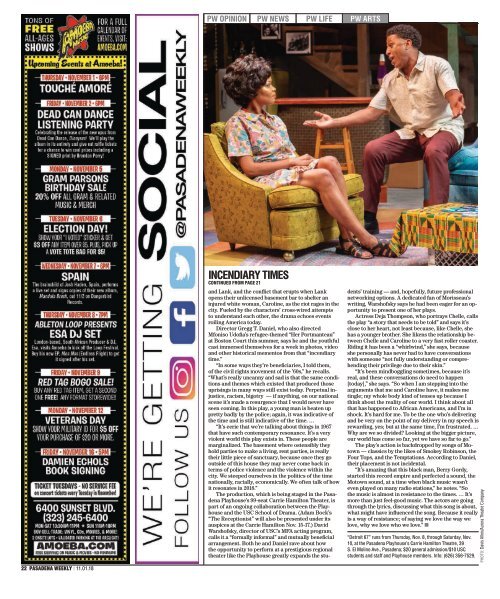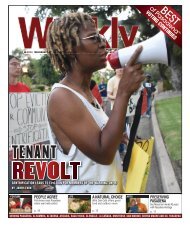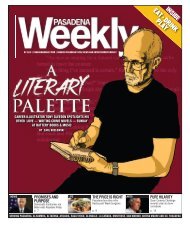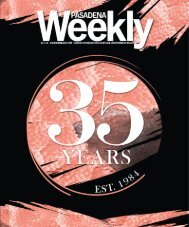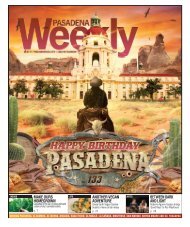11.01.18
Create successful ePaper yourself
Turn your PDF publications into a flip-book with our unique Google optimized e-Paper software.
PW OPINION PW NEWS PW LIFE PW ARTS<br />
22 PASADENA WEEKLY | <strong>11.01.18</strong><br />
INCENDIARY TIMES<br />
CONTINUED FROM PAGE 21<br />
and Lank, and the conflict that erupts when Lank<br />
opens their unlicensed basement bar to shelter an<br />
injured white woman, Caroline, as the riot rages in the<br />
city. Fueled by the characters’ cross-wired attempts<br />
to understand each other, the drama echoes events<br />
roiling America today.<br />
Director Gregg T. Daniel, who also directed<br />
Mfoniso Udofia’s refugee-themed “Her Portmanteau”<br />
at Boston Court this summer, says he and the youthful<br />
cast immersed themselves for a week in photos, video<br />
and other historical mementos from that “incendiary<br />
time.”<br />
“In some ways they’re beneficiaries, I told them,<br />
of the civil rights movement of the ’60s,” he recalls.<br />
“What’s really uncanny and sad is that the same conditions<br />
and themes which existed that produced those<br />
uprisings in many ways still exist today. Perpetual injustice,<br />
racism, bigotry — if anything, on our national<br />
scene it’s made a resurgence that I would never have<br />
seen coming. In this play, a young man is beaten up<br />
pretty badly by the police; again, it was indicative of<br />
the time and is still indicative of the time. …<br />
“It’s eerie that we’re talking about things in 1967<br />
that have such contemporary resonance. It’s a very<br />
violent world this play exists in. These people are<br />
marginalized. The basement where ostensibly they<br />
hold parties to make a living, rent parties, is really<br />
their little piece of sanctuary, because once they go<br />
outside of this house they may never come back in<br />
terms of police violence and the violence within the<br />
city. We steeped ourselves in the politics of the time<br />
nationally, racially, economically. We often talk of how<br />
it resonates in 2018.”<br />
The production, which is being staged in the Pasadena<br />
Playhouse’s 99-seat Carrie Hamilton Theater, is<br />
part of an ongoing collaboration between the Playhouse<br />
and the USC School of Drama. (Adam Bock’s<br />
“The Receptionist” will also be presented under its<br />
auspices at the Carrie Hamilton Nov. 15-17.) David<br />
Warshofsky, director of USC’s MFA acting program,<br />
calls it a “formally informal” and mutually beneficial<br />
arrangement. Both he and Daniel rave about how<br />
the opportunity to perform at a prestigious regional<br />
theater like the Playhouse greatly expands the students’<br />
training — and, hopefully, future professional<br />
networking options. A dedicated fan of Morisseau’s<br />
writing, Warshofsky says he had been eager for an opportunity<br />
to present one of her plays.<br />
Actress Deja Thompson, who portrays Chelle, calls<br />
the play “a story that needs to be told” and says it’s<br />
close to her heart, not least because, like Chelle, she<br />
has a younger brother. She likens the relationship between<br />
Chelle and Caroline to a very fast roller coaster.<br />
Riding it has been a “whirlwind,” she says, because<br />
she personally has never had to have conversations<br />
with someone “not fully understanding or comprehending<br />
their privilege due to their skin.”<br />
“It’s been mindboggling sometimes, because it’s<br />
real, and these conversations do need to happen<br />
[today],” she says. “So when I am stepping into the<br />
arguments that me and Caroline have, it makes me<br />
tingle; my whole body kind of tenses up because I<br />
think about the reality of our world. I think about all<br />
that has happened to African Americans, and I’m in<br />
shock. It’s hard for me. To be the one who’s delivering<br />
and be very on the point of my delivery in my speech is<br />
rewarding, yes; but at the same time, I’m frustrated. …<br />
Why are we so divided? Looking at the bigger picture,<br />
our world has come so far, yet we have so far to go.”<br />
The play’s action is backdropped by songs of Motown<br />
— classics by the likes of Smokey Robinson, the<br />
Four Tops, and the Temptations. According to Daniel,<br />
their placement is not incidental.<br />
“It’s amazing that this black man, Berry Gordy,<br />
started this record empire and perfected a sound, the<br />
Motown sound, at a time when black music wasn’t<br />
even played on many radio stations,” he notes. “So<br />
the music is almost in resistance to the times. … It’s<br />
more than just feel-good music. The actors are going<br />
through the lyrics, discussing what this song is about,<br />
what might have influenced the song. Because it really<br />
is a way of resistance; of saying we love the way we<br />
love, why we love who we love.” n<br />
“Detroit 67” runs from Thursday, Nov. 8, through Saturday, Nov.<br />
10, at the Pasadena Playhouse’s Carrie Hamilton Theatre, 39<br />
S. El Molino Ave., Pasadena; $20 general admission/$10 USC<br />
students and staff and Playhouse members. Info: (626) 356-7529.<br />
PHOTO: Davis Allen/Aurora Theatre Company


